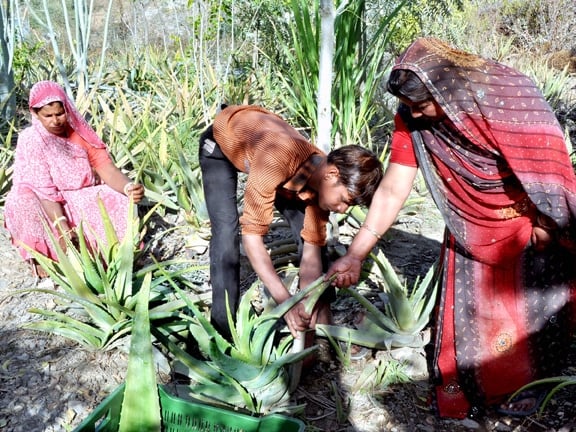
by Purnima Ramakrishnan | Jul 23, 2013 | Casting a Wider Net, Economy, Education, Feminism, Government, Human Rights, Humanity, India, Inspirational, International, Motherhood, Nature, Purnima, Social Good, The Alchemist, United Nations, Women's Rights, World Moms Blog, World Voice
A couple of weeks ago, we featured a remote village, Piplantri (Western India) on the Gates Foundation. Piplantri is a model village, whose actions of change have been very well received all over India.
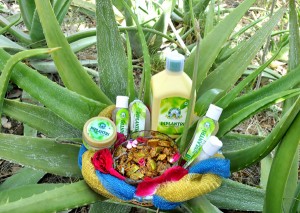
Aloe Vera products from the small scale industries
They plant 111 trees for every girl child who is born, create a fixed deposit of INR 31,000 (approx. USD 620) in her name which attains maturity when she is 18 years old and chalk up a legal agreement between the parents of the girl child and the government that they won’t get their girls married off before she is 18 years old. They also have Aloe Vera industries in which the women of the village are employed. So they have achieved MDGs #3 (promote gender equality and empower women), #4 (reduce child mortality), and #7 (ensure environmental sustainability) at one go. Today on the blog, I would like to introduce Mr. Shyam Sundar Paliwal and his wife, Anita, who were the pioneers of this change action in their village. Anita is 42 years old, and she got married after she finished her 12th grade. It was an arranged marriage and the couple were happy.
Their first daughter Kiran was 18 years old when she passed away. She died due to dehydration. That was the turning point in their life, and they vowed to make lives of others happy.
They also have another daughter Hemanshi (22) and a son Rahul (15) who is in 10th grade. Hemanshi is married and has a child, too.
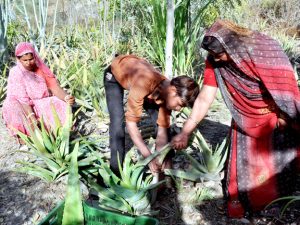
The women of the village tending Aloe Vera
Anita recalls that when she came to her in-laws place after she got married, the first lesson she received from her father-in-law was to plant banana saplings such that they bear fruits during the rainy season and then plant mango saplings around the banana trees. Banana trees absorb water during the monsoon and transfers this water to the mango trees through its roots during the arid summer season. She says she has stuck to this piece of advice to date in her village and ensured that her villagers follow such age-old farming wisdom.
Anita, who is the wife of the ex-sarpanch (ruling political head) of the village, Piplantri, is a very active community member. She is a Zila Parishad Member (Elected person of the district council). Her husband has always been supportive of her as a woman and wants her to do her best for her villagers. He has never restricted her in any way. Though she is more educated than him, he has never been jealous of her, but has only encouraged her and furthered her growth and development as an active member of their society and community. She says, if only all women of the world gets a husband like Shyam, the women of the world will be better off and we would not be speaking of women’s rights here.
Shyam Sundar won the panchayat elections in 2005 and he says he first wanted the people who worked in the government offices to be comfortable. He installed the first AC in the office, brought in some comfortable furniture and ensured that people in all echelons of the society were treated equally. (In rural India, at times, the upper caste people are given more respect and sit on chairs, whereas the lower caste people are treated shabbily and sit down on the floor. Read more about the Evils of Caste system in India here). He said, he worked on the psychology of the ruling body to make them happy and comfortable. He says, only if they are happy, they would start working on reform measures and help provide for the remaining villagers. He, at his own expense, made the offices a comfortable place to work and conducive to provide better results.
He started small. In this difficult water shortage era, he diverted the waste water from all houses/offices towards the fields. Better water conservation was ensured. If waste water does not stagnate anywhere, there would be no mosquitoes and no dengue and fewer diseases. So, he solved primarily problems with simple, cost-effective solutions.
He installed drinking RO water systems in schools. Brought in furniture for the students and made the public schools better than the expensive private schools. People started flocking towards government schools. He raised awareness slowly and in a small way, which evolved out.
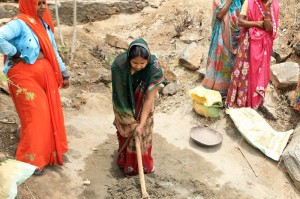
Mrs. Anita Paliwal working on the Water Harvesting Structure
He started rain water harvesting with the help of government. He built canals. He used the women of the village who were unemployed. To the left is a picture of Anita, who at times does not hesitate to get into the fields with a mean sickle. She and her husband were instrumental in starting the water harvesting structure of the village. In most of his welfare activities 90% of the employed are women and 10% alone are men. Women of the village have been blessed indeed to have him there, says Anita. In addition to 25,00,000 Aloe Vera plants, there are 10,000 rose shrubs which are also used in small-scale industries for toiletries and medicinal supplements. Women are employed in all of these schemes.
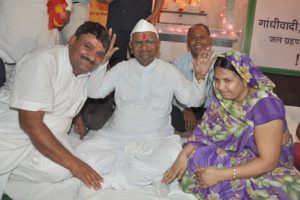
Mr. Shyan Sundar Paliwal and Mrs. Anita Paliwal with Anna Hazare
He started the Kiran Nidhi Yojna with the 76-year-old International Social Activist, Anna Hazare to ensure that no girl child is married off before 18 years old. This man who himself did not study in a college, ensures that all girl children in his village get a college degree. He also nudges the parents to get their girls married off in collective wedding, so that money is conserved and better utilised for other public welfare schemes or for their own savings. This scheme also granted government land to the parents in return for planting 111 trees on the birth of their daughter in that land, and tending to it to fruition before their girl child is 18 years old. On the death of any community member, the family is requested to plant trees again.
He says this again works on their psychology. The girl children treat the trees as their own brothers and sisters. After all, the saplings were planted on the day of their birth. And the parents get emotionally attached to the trees which came into existence on the day their family member was born or died. They then take care of it as a family member, and would under no means cut it down. He says, it is all in the hearts of the people. If people get involved with their hearts, anything is possible. He made people to get emotionally attached to nature and trees and the earth.
I learnt something new from Anita and Shyam that day – Ecofeminism. It is such a beautiful concept. Women and nature have been connected since time immemorial and this couple have harnessed it.
After all, he who was not highly educated could work on such things and make that beautiful village into a heaven, he says, the whole world could change too. And we would have no need to talk about the MDGs or uplifting of any downtrodden society/community.
When asked how he felt when his village was showcased by the Gates Foundation on their Blog, he gushed with happiness and pride. The district collector and Panchayat officials were so excited, too, he said. But his only complaint was that he could not get a hard copy of the magazine which he could show his villagers. He is so proud like a father, like the father of the heaven he created.
He also invites donation to his Kiran Yojna Scheme for the fixed deposit of INR 31000 of every girl child born in his village. He invites the contributors, readers and fans of World Moms Blog to make a trip to Piplantri. He wants people to embrace such change and for them to build upon it to suit their own society, and community.
This is an original post to World Moms Blog by Purnima, our Indian mother writing from Chennai, India. Her contributions to the World Moms Blog can be found here. She also rambles at The Alchemist’s Blog.
Photo credit to Piplantri.com
What do you think about the traditions put in place to support girls and women in the community of Piplantri?

by Shaula Bellour (Indonesia) | Jul 18, 2013 | Childhood, Communication, Family, Grandparent, Indonesia, Relationships, Shaula Bellour, Twins, Uncategorized, USA
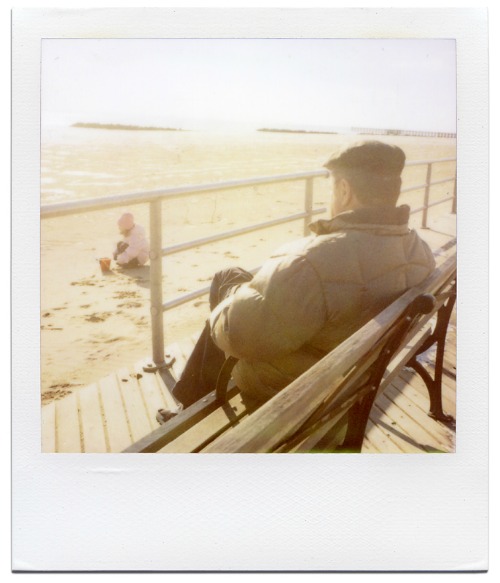 Out of the blue, my daughter recently asked “Mommy, who is your Daddy?” “My Daddy is Grandpa”, I said. “Do you remember him? We visited him in the desert.” “No, Mommy. Can we go to the desert again, so I can remember him?”
Out of the blue, my daughter recently asked “Mommy, who is your Daddy?” “My Daddy is Grandpa”, I said. “Do you remember him? We visited him in the desert.” “No, Mommy. Can we go to the desert again, so I can remember him?”
This breaks my heart.
Growing up, I always had a close relationship with my Dad. We are kindred spirits in many ways, and he has had a big influence on the shape of my life.
When I was 14, my parents separated, and my Dad moved to San Francisco. I loved visiting him there and experiencing the world beyond my suburban life – touring the city together while he listened, offered perspective and treated me like the adult I was becoming. After my friend backed out of our planned graduation trip to France – my first overseas experience – my Dad encouraged me to go by myself. Buoyed by his confidence, I took the leap…and thus began my traveling life.
Over the years he expressed only enthusiasm for my far-flung travel plans and showed up to philosophize over wine in Paris and fresh roasted coffee in Eritrea. Between adventures (and sometimes jobs), his home was a welcoming safe haven.
I always thought my Dad would make a wonderful grandfather. He is a gifted storyteller, seems to know everything about everything and even has a Santa Claus look about him – white hair, smiling eyes and a jovial laugh.
However, until now he has played a very hands-off role in my children’s lives.
In the years after the twins were born, we visited each other a handful of times. As a new mom, I had less time for keeping in touch – and my adventure tales were decidedly less riveting – but he was still just a phone call away, and I often took advantage of my rare alone time (usually while walking the dog) to give him a ring.
After moving to Asia 3 years ago, communication has dwindled. These days we might get an occasional email, but there are no skype chats, phone calls, letters, or birthday presents to unwrap. When you live far away from family, these are the things that keep us close – the quick IM exchanges, silly video chats, emailed notes and drawings, and slightly dented packages with exciting postmarks.
Luckily, my Mom and my British in-laws make a great deal of effort to keep in touch and up to date on our daily lives, which I am so grateful for. Our kids know, love and miss them and it’s a joy to watch their relationships grow and thrive despite the miles between us.
Three out of four grandparents isn’t bad, yet, I still feel disappointed by the Grandpa gap in our lives.
Everyone is missing out ,and I feel sad that my fantastic kids don’t know my equally fantastic Dad and that he doesn’t know them. Ultimately, though, their grandfather-grandchild relationship belongs to them. I can encourage this special bond, but I can’t create their connection or force them to know and love one another.
I also feel disappointed in my Dad’s hands-off role in my own life since having kids. Just because I am now a parent doesn’t mean that I don’t still need my own parent. Though I’m now living in the big wide world that he encouraged me to explore, all of the same advice applies. And sometimes I still need it.
In a few weeks we will drive our little family to the desert to visit my Dad for the first time in 2 years.
My hope is that my Dad and my children will have time to get to know each other and create some special memories during our short visit. For myself, I hope to reconnect with an open heart and commit to communicating better going forward.
Life is simply too short.
How do you maintain relationships with family when living far away? Has your relationship with your parents changed since you became a parent?
This is an original post to World Moms Blog by Shaula Bellour in Jakarta, Indonesia. Her blog, Notes From a Small World, is currently on hiatus but she promises to return to blogging soon.
Photo credit to Kihoon Park. This photo has a creative commons attribution license.
Shaula Bellour grew up in Redmond, Washington. She now lives in Jakarta, Indonesia with her British husband and 9-year old boy/girl twins. She has degrees in International Relations and Gender and Development and works as a consultant for the UN and non-governmental organizations.
Shaula has lived and worked in the US, France, England, Kenya, Eritrea, Kosovo, Lebanon and Timor-Leste. She began writing for World Moms Network in 2010. She plans to eventually find her way back to the Pacific Northwest one day, but until then she’s enjoying living in the big wide world with her family.
More Posts

by Alison Fraser | Jul 16, 2013 | 2013, Economy, Human Rights, India, Social Good, World Moms Blog
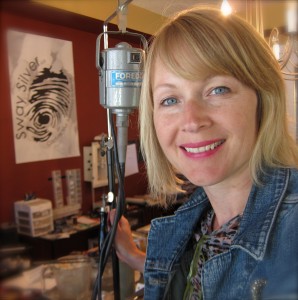
Heather Horsey of Swaysilver jewelry
As we all know, raising children in today’s society can be a financial challenge for many. As mothers, we are often seeking the best deal on the purchases we make. Like many, I do consider myself to be a responsible consumer and I try to purchase from ethical sources.
The recent tragedy in a Bangladesh factory that resulted in the loss of hundreds of lives, however, revealed that some of the stores that I purchase from on a regular basis were in some way or another linked to the poor working conditions of this particular factory.
The majority of those who lost their lives that tragic day were our fellow mothers, working to provide the basis necessities of life to their families.
Those lost in the building collapse have not been far from my thoughts since that day. My appreciation has greatly increased for the companies run by my fellow Canadian moms who I know put the ethical treatment employees as a top priority in their company operations. Peekaboo Beans, Redfish Kids Clothing, KiKi Kids, and Red Thread Design are some of my favourite Canadian brands started and operated by some fabulous Canadian moms.
The success of these businesses lead me to wonder: why can’t all companies choose to manufacture goods in an ethical manner? Isn’t it a fundamental obligation of ours? Why is that for some, despite the obvious financial challenges, this is of such high importance, and yet for many, it is not? In order to address this issue, I decided to speak to a friend and local artisan, who I know has given this very topic much thought and consideration.
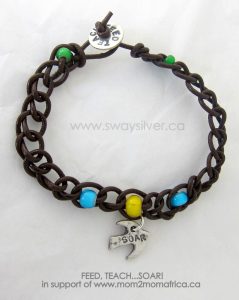
Soar bracelet by Heather Horsey
Heather Horsey makes beautiful silver jewellery in my Canadian hometown. She recently designed and marketed a “Teach, Feed, Soar” bracelet benefitting my not for profit organization, Mom2Mom Africa. I asked Heather why she chooses to run her business, Swaysilver, in such an admirable and ethical manner.
Her response was equally as admirable: “It’s no secret that for centuries the jewellery industry has been wrought with social injustices and it’s good to see some headway being made in the ethical production of jewellery by using recycled materials and lab-created gemstones. The metal I use is recycled silver, harvested from catalytic converters from the car manufacturing industry. In my opinion, a lot of good has come out of creating jobs overseas, however, it is in the best interest of everyone to make sure the working conditions are safe and pay is fair”.
It is common knowledge that overseas factories provide a huge cost-savings to many companies, enabling them to provide products to interested purchasers at bargain prices. This is a huge challenge to entrepreneurs, like Heather, who are trying to provide products at a competitive price without compromising ethical standards.
According to Heather, “while bargains are enticing, I’d rather buy from a company that I know is going above and beyond to put caring for people first no matter where the product is being made. Competing in price is a challenge only when it is assumed that I should be able to make by hand something that is quickly made by machine in a factory overseas. I do my best to create designs that are original and artistically interesting in order to set my work apart from something that is mass-produced”.
I truly believe that we need to shift our focus from finding the best possible bargain to instead ensuring that our purchased products are being made in a manner that provides safe and respectable working conditions for employees. I encourage everyone to research the way in which products from your favourite companies are produced. Our actions have a direct impact on the lives of many around the world. It is our moral obligation to help those in need, and not endanger the lives of others in order to benefit ourselves. I encourage you to support local artisans and companies of high ethical standards in your communities.
Saving a few dollars can mean the difference between life and death for others.
As mothers and consumers, we have the power to create change and prevent another needless workplace tragedy.
This is an original World Moms Blog post by Canadian writer and founder of Mom2Mom Africa, Alison Frasier.
Are you conscientious about the ethics and conditions under which the products you purchased are sourced?
Alison Fraser is the mother of three young girls ranging in age from 5 to 9 years old. She lives with her family in Cambridge, Ontario, Canada. Alison works as an Environmental Toxicologist with a human environment consulting company and is an active member of the Society of Environmental Toxicology and Chemistry (SETAC). She is also the founder and director of the Canadian Not for Profit Organization, Mom2Mom Africa, which serves to fund the school fees of children and young women in rural Tanzania. Recently recognized and awarded a "Women of Waterloo Region" award, Alison is very involved in charitable events within her community including Christmas Toy and School Backpack Drives for the local foodbank.
More Posts - Website
Follow Me:



by Susan Koh | Jul 11, 2013 | Inspirational, International, Life Lesson, Motherhood, Parenting, Singapore, Susan Koh, World Moms Blog, World Motherhood
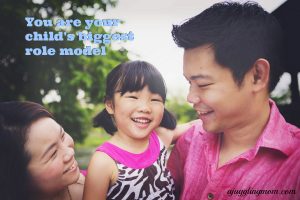 I’m pretty confident when I say I have most things under control at home. But when it comes to driving, that’s where I fail miserably. I got my driving license 10 years years ago, and by right, driving to me should be easy peasy by now. But just like teaching a child to ride a bike, we all know that practice makes perfect. And that sums up why I’m so lousy at it because no drive equals no practice.
I’m pretty confident when I say I have most things under control at home. But when it comes to driving, that’s where I fail miserably. I got my driving license 10 years years ago, and by right, driving to me should be easy peasy by now. But just like teaching a child to ride a bike, we all know that practice makes perfect. And that sums up why I’m so lousy at it because no drive equals no practice.
Over the weekends, I had to drive. Had to because my dear husband extracted two of his wisdom teeth and was feeling very uncomfortable behind the wheels. So as his wife, here’s when I have to rise to the occasion to relieve him. So I agreed to take over, grudgingly.
My little back seat driver was observing me and parroting Alexis’s instructions to me to slow down, drive straight, don’t turn so fast. Sensing that I was getting more and more frustrated as I drove, she told me, “Mummy, don’t drive until so angry. Just drive. Drive slowly okay.” In my head, I thinking that having her in the car is such a bad idea as she’s seeing the worst of me.
At some point when I have to manuveour between changing gears and the hand brakes to go up a slope, I nearly burst out crying and exclaimed exasperatedly at my husband and child, “I’m trying, I trying my best ok!” (more…)
Susan is from Singapore. As a full-time working mom, she's still learning to perfect the art of juggling between career and family while leading a happy and fulfilled life. She can't get by a day without coffee and swears she's no bimbo even though she likes pink and Hello Kitty. She's loves to travel and blogs passionately about parenting, marriage and relationship and leading a healthy life at A Juggling Mom.
More Posts

by Mamawearpapashirt (Singapore) | Jul 4, 2013 | Being Thankful, Singapore, World Moms Blog
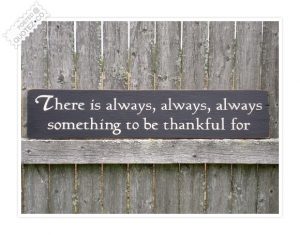 According to international pollster Gallup, based on a poll of nearly 150,000 people worldwide conducted in 2011, Singapore came out tops on the list of countries that are least happy.
According to international pollster Gallup, based on a poll of nearly 150,000 people worldwide conducted in 2011, Singapore came out tops on the list of countries that are least happy.
To be honest, I was surprised and yet not. Singapore is a pretty well-to-do country, well-organised and well-governed, in most senses of the word.
Yet, we’ve all been labelled as “unhappy people.”
A little video went out to the streets of Singapore to ask people “What makes YOU happy?” Here are some popular answers:
- Love.
- Family.
- My wife / husband.
- When the kids are happy.
- Time. To rest. Exercise. Do the things we love. Spend time with the people we love.
(Things that people living on the other end of the globe could probably be saying too huh?)
It struck me to realise that the things that make us happy are pretty universal, shared across nationalities, ethnicities, gender, and socio-economic status. They relate to every human being’s most intrinsic needs – We all want to be loved, want to feel safe, be understood, and valued by others, especially our loved ones. Don’t we?
I think thankfulness is one of the major keys to happiness.
But when we start comparing with the Joneses, or seeing and desiring the things that we don’t have, it can start to feel pretty ugly inside.
Also, a simple act of kindness and helping others. Somehow never fails to make us feel warm and fuzzy inside.
Ultimately, happiness lies in our own little hands. We can all take steps towards happiness today. By appreciating ourselves and our spouses, counting our blessings, cherishing time with family (despite our individual weaknesses and quirks), and enjoying our children.
Seeing my little ones jump and tear down the pathway towards the playground makes me happy.
Receiving a hug and a kind loving word from my husband at the end of the day makes me happy.
Making time to dig into a good book, or going for a walk and counting bees and flowers make me happy.
We may all have our struggles, our fears, our worries, but by breathing out life’s stressful moments, and breathing in such moments of inexpressible joy and delight (and letting them linger in my heart) keeps me grounded, and helps me navigate this journey we’re all on – parenthood.
Joy is a way of life. An intentional choice.
When our kids see us making that choice, I’m sure they are likely to make similar choices in future. Positive. With a bright outlook on life. Resilient. People who try to make the best out of the lemons that life may bring.
What do you think? And what makes you happy?
If you have 4.5 minutes, do watch this video to see what other Singaporeans are saying:
[youtube http://www.youtube.com/watch?v=1ZaIsR9seMo]
This is an original post by June Yong of Singapore, for World Moms Blog. June blogs about motherhood and other joys, over at Mama Wear Papa Shirt.
Photo credited to http://quotez.co/there-is-always-something-to-be-thankful-for-happiness-quotes/
June, born and bred on the sunny and sometimes rainy shores of Singapore, is a mother of two - a chatty 4 y.o. girl and a toddler boy who babbles. She works part-time as a communication consultant, and she is deeply passionate about family, writing, faith, and good old-fashioned love. She can be found on her blog, Mamawearpapashirt.
More Posts

by Veena Davis (Singapore) | Jun 20, 2013 | Family, Home, Husband, Parenting, Singapore, World Moms Blog, World Motherhood
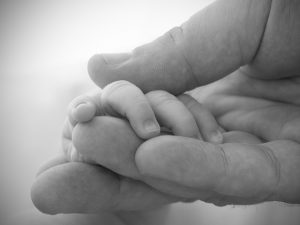 We continue honoring the fathers out there, even after Father’s Day! Today, Veena writes about her thoughts on the roles of fathers, and their unique hallmarks.
We continue honoring the fathers out there, even after Father’s Day! Today, Veena writes about her thoughts on the roles of fathers, and their unique hallmarks.
Motherhood and Mother’s Day are celebrated the world over – but how much does the world really realise a father’s sacrifices for his family?
According to Merriam-Webster, a father is :
fa·ther (fä

 r)
r)
n.
a. A male person whose sperm unites with an egg, resulting in the conception of a child.
b. A man who adopts a child.
c. A man who raises a child.
As mothers, we all know the amount of work involved in raising a child. So, how many of you would agree to the first definition of a father – sperm uniting with an egg? Or even the second?
A father – in the truest sense of the word – is one who begets a child and stands up for the mother and child through thick and thin. He is there during the sunny times and rainy days, during happiness and sorrow. And through sickness and health.
I am a full-time working mother – made possible only with the complete support of my husband. When I have to travel on business trips, or stay late at office, he is there for my Li’l One.
India (where I am from) is a patriarchal society with the men taking the upper hand in most spheres of life and work. When a girl gets married, she is usually expected to resign if her husband (or his family) doesn’t want her to work (often with no regard to her wish to continue working), she may have to move to a new city if her husband is located there, and more often than not, she is expected to give up her job once she has a kid. Or if the husband gets a posting abroad, the wife just has to drop everything and follow him there.
Sometimes when I go home, there are relatives who look askance when I say I have to attend a call or a meeting, or that I have no time for some thing. According to some of them, I should be devoting more time to womanly pursuits – like cooking, attending Church or some such activity.
This is quite funny, because my paternal Grandfather was a person who believed in a girl’s right to education and managed to get all 3 of his daughters educated and in government jobs. And he had just 2 granddaughters (me and a cousin) from a brood of 10 grand-kids, and both of us are full-time working mothers. Needless to say, none of the women who married into the family are working outside the house (for various reasons).
I have nothing against home makers – my Mother is one herself – and I am eternally thankful to her for her decision to stay home and look after us. All I am saying is that no one has any right to judge whether a woman should work or not, and decide what should be her priorities in life.
Now, I have a tremendous opportunity to move to Singapore, and my husband is again there for me – completely supporting my decision, and ready to move over as a family – not heeding any unwanted voices that may whisper about the inappropriateness of a husband moving because of his wife’s work priorities.
So far, I have just seen a single friend who moved abroad because his wife was transferred there on a project. And here I am – honoured to have such a caring person as a partner. He is always there with a helping hand in the kitchen (one place I detest). He has a bad back, and yet refuses to let me carry the heavy stuff. Every time I am back from my business trips, he insists on driving over with Li’l One to the airport, so that I don’t have to worry about getting a cab late at night. And no matter how worn out he is, he always has a smile for Li’l One and me.
In fact, it is all there in the little things – the way he always slows down the car to allow a person to cross the road, or a car waiting at a U-turn to take the turn. Or the pains he has taken to win over my family, in spite of us having an intercaste marriage (a terrible taboo in India) and even after having been subtly snubbed by some of my extended family (something that could very well result in cutting ties with the wife’s family forever). Or even the times he has packed up the house during the umpteen moves we have had ( 6 in the last 7 years), and let me go to a friend’s place or my home (and yes, I offered to stay and do the packing, but he was insistent that I leave it all to him).
Here is a salute to Fathers all over the world!
What makes your partner the best in the world? How does he help you out in your day?
Veena has experienced living in different climes of Asia - born and brought up in the hot Middle East, and a native of India from the state known as God’s Own Country, she is currently based in the tropical city-state of Singapore. ⠀ ⠀ ⠀ ⠀ ⠀ ⠀ ⠀ ⠀ ⠀ ⠀ ⠀ ⠀ ⠀ ⠀ ⠀ ⠀ ⠀ ⠀ ⠀ ⠀ Several years ago, she came across World Moms Network (then World Moms Blog) soon after its launch, and was thrilled to become a contributor. She has a 11-year old son and a quadragenarian husband (although their ages might be inversed to see how they are with each other sometimes). ⠀ ⠀ ⠀ ⠀ ⠀ ⠀ ⠀ ⠀ ⠀ ⠀ ⠀ ⠀ ⠀ ⠀ ⠀ ⠀ ⠀ ⠀ ⠀ ⠀ ⠀ ⠀ ⠀ ⠀ ⠀ ⠀ ⠀ ⠀ ⠀ ⠀ ⠀ ⠀ ⠀ ⠀ ⠀ On a professional front, she works in the financial sector - just till she earns enough to commit to her dream job of full-time bibliophile. ⠀ ⠀ ⠀ ⠀ ⠀ ⠀ ⠀ ⠀ ⠀ ⠀ ⠀ ⠀ ⠀ ⠀ ⠀ ⠀ ⠀ ⠀ ⠀ ⠀ ⠀ ⠀ ⠀ You can also find Veena at her personal blog, Merry Musing. ⠀
More Posts - Website












 Out of the blue, my daughter recently asked “Mommy, who is your Daddy?” “My Daddy is Grandpa”, I said. “Do you remember him? We visited him in the desert.” “No, Mommy. Can we go to the desert again, so I can remember him?”
Out of the blue, my daughter recently asked “Mommy, who is your Daddy?” “My Daddy is Grandpa”, I said. “Do you remember him? We visited him in the desert.” “No, Mommy. Can we go to the desert again, so I can remember him?”



 I’m pretty confident when I say I have most things under control at home. But when it comes to driving, that’s where I fail miserably. I got my driving license 10 years years ago, and by right, driving to me should be easy peasy by now. But just like teaching a child to ride a bike, we all know that practice makes perfect. And that sums up why I’m so lousy at it because no drive equals no practice.
I’m pretty confident when I say I have most things under control at home. But when it comes to driving, that’s where I fail miserably. I got my driving license 10 years years ago, and by right, driving to me should be easy peasy by now. But just like teaching a child to ride a bike, we all know that practice makes perfect. And that sums up why I’m so lousy at it because no drive equals no practice.
 According to international pollster Gallup, based on a poll of nearly 150,000 people worldwide conducted in 2011, Singapore came out tops on the list of countries that are least happy.
According to international pollster Gallup, based on a poll of nearly 150,000 people worldwide conducted in 2011, Singapore came out tops on the list of countries that are least happy.
 We continue honoring the fathers out there, even after Father’s Day! Today, Veena writes about her thoughts on the roles of fathers, and their unique hallmarks.
We continue honoring the fathers out there, even after Father’s Day! Today, Veena writes about her thoughts on the roles of fathers, and their unique hallmarks. 


